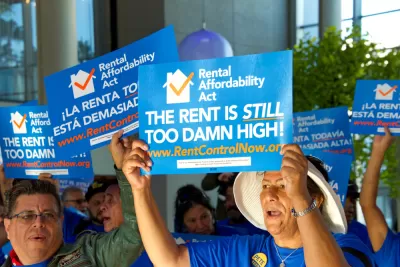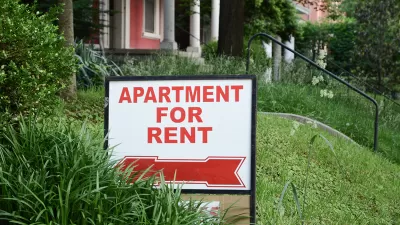Geoff Boeing of the University of Southern California writes about a recent article he co-authored in the Journal of Planning Education and Research.

How much does it cost to rent a typical apartment in your city? Answering this basic housing question can be surprisingly difficult. Consider the case of San Francisco in early 2018. According to the then-most recent American Community Survey (ACS), a typical two-bedroom unit rented for $2,017 per month. We can compare this figure to the then-most recent American Housing Survey (AHS)—whose data are only available for the entire San Francisco metropolitan statistical area (MSA)—to find a median two-bedroom rent of $1,722.
In reality, anyone attempting to move to San Francisco or its suburbs then would have been hard-pressed to find a two-bedroom apartment on the market at these rent levels. The U.S. Department of Housing and Urban Development’s (HUD) contemporaneous Fair Market Rent (FMR)—to determine Section 8 voucher payments to landlords—was $3,121 for a 40th-percentile two-bedroom unit in San Francisco’s MSA. Meanwhile, Zillow estimated that the median two-bedroom unit in the city proper rented for $4,197—double the ACS estimate.
How do we make sense of the drastic discrepancies between these estimates? They obviously differ in recency due to publication lags, in geography as some cover the core city while others cover the MSA, and possibly in sampling biases. However, when considering how much it costs to rent a home, an equally important distinction exists between data that report rents for the transacted market (existing leases) and those that report on the spot market (current asking rents). That is, does the data product tell us what a typical existing renter pays each month, or rather what someone must pay if they currently seek housing? Transacted market data could diverge significantly from the spot market due to publication lags, market lags, subsidies, rent control, and length-of-stay discounts.
Most readily-available sources of rents in U.S. communities report data for the transacted market rather than the spot market. While such data sources are valuable, they do not tell us what someone currently must pay to acquire housing. Yet according to the 2016 ACS, 37% of U.S. renters reported having moved since the beginning of 2015, and according to the contemporaneous AHS more renters in urbanized areas found their current homes through online listing sites like Craigslist than through any other information source. Much of this recent market activity remains illegible to planners, inhibiting important research and policy development on pressing issues like economic mobility, affordability, and displacement.
How well do readily-available rent estimates represent the rental spot market in different cities? In our recent JPER article, we analyzed millions of Craigslist rental listings and found that existing data sources typically understate how expensive it is for people to relocate, with particular ramifications for voucher holders and intermetropolitan movers.
In most MSAs—and particularly those with booming job markets and constrained housing production—asking rents substantially exceed contemporaneous ACS, FMR, and AHS estimates. We might expect Craigslist's asking rents to exceed more-representative estimates if it over-represents high-rent neighborhoods and units. Yet Craigslist does not exclusively represent the high-end rental market: about half of its asking rents would be affordable for households just below the U.S. median income and about a quarter would be affordable for households just below the corresponding African-American median. Craigslist hosts millions of rental listings each month, many of which are within the reach of low- and moderate-income families.
Households using vouchers to relocate to higher-opportunity neighborhoods could benefit from Craigslist’s broadcasting of information if it helps them find voucher-eligible units in unfamiliar choice neighborhoods, overcoming their own locally-constrained market knowledge. Online information exchanges thus play a potentially crucial role in ongoing residential sorting and segregation. Their data trails could even help policymakers set FMRs to better reflect rapidly-evolving market conditions.
Further, while people looking to relocate locally may have the option to utilize soft ties, tacit regional knowledge, and in-person scouting trips to identify suitable housing units, people looking to relocate from out of town depend much more on online information exchanges and rental listings to conduct housing searches. In cities like Boston, Washington, Portland, and Seattle, over 25% of movers were from different states or abroad. Online information exchanges are central to many out-of-town moves.
How can planners gain broader access to online rental listings data? The Census Bureau or HUD could partner with online listing sites such as Craigslist, Zillow, and RentJungle to maintain a constantly updated spot market data product. As with all other census microdata, various steps would need to be taken to appropriately safeguard anonymity and privacy. Alternatively, a consortium of university-based research centers might collaborate with online listing sites to routinely acquire listings and operate a data clearinghouse. Regardless of the exact model, a rich set of spot market data should be made widely and publicly available to help planners address pressing rental housing questions.
"Rental Housing Spot Markets: How Online Information Exchanges Can Supplement Transacted-Rents Data" available via open access for 30 days.

Trump Administration Could Effectively End Housing Voucher Program
Federal officials are eyeing major cuts to the Section 8 program that helps millions of low-income households pay rent.

Planetizen Federal Action Tracker
A weekly monitor of how Trump’s orders and actions are impacting planners and planning in America.

The 120 Year Old Tiny Home Villages That Sheltered San Francisco’s Earthquake Refugees
More than a century ago, San Francisco mobilized to house thousands of residents displaced by the 1906 earthquake. Could their strategy offer a model for the present?

HSR Reaches Key Settlement in Northern California City
The state’s high-speed rail authority reached an agreement with Millbrae, a key city on the train’s proposed route to San Francisco.

Washington State Legislature Passes Parking Reform Bill
A bill that would limit parking requirements for new developments is headed to the governor’s desk.

Missouri Law Would Ban Protections for Housing Voucher Users
A state law seeks to overturn source-of-income discrimination bans passed by several Missouri cities.
Urban Design for Planners 1: Software Tools
This six-course series explores essential urban design concepts using open source software and equips planners with the tools they need to participate fully in the urban design process.
Planning for Universal Design
Learn the tools for implementing Universal Design in planning regulations.
Ada County Highway District
Clanton & Associates, Inc.
Jessamine County Fiscal Court
Institute for Housing and Urban Development Studies (IHS)
City of Grandview
Harvard GSD Executive Education
Toledo-Lucas County Plan Commissions
Salt Lake City
NYU Wagner Graduate School of Public Service





























